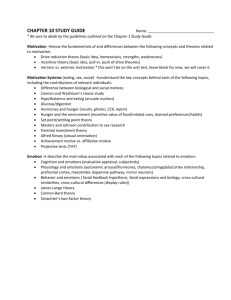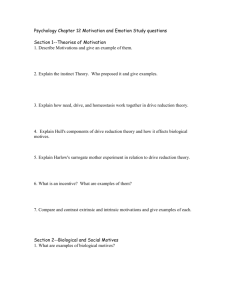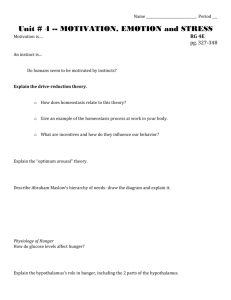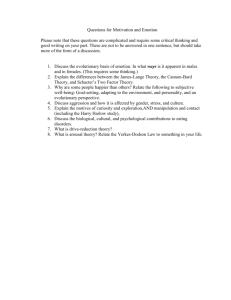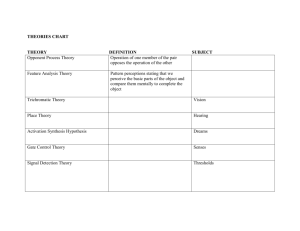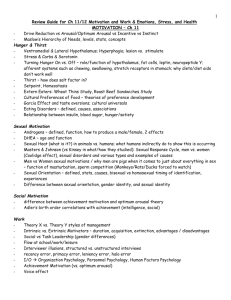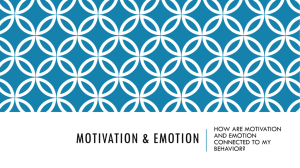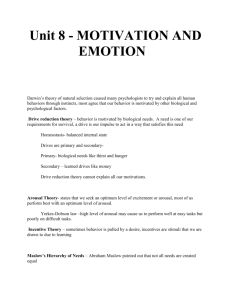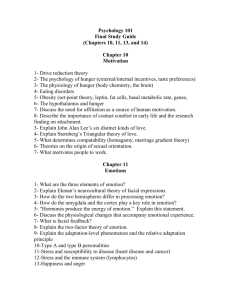Emotion, Motivation and Stress
advertisement
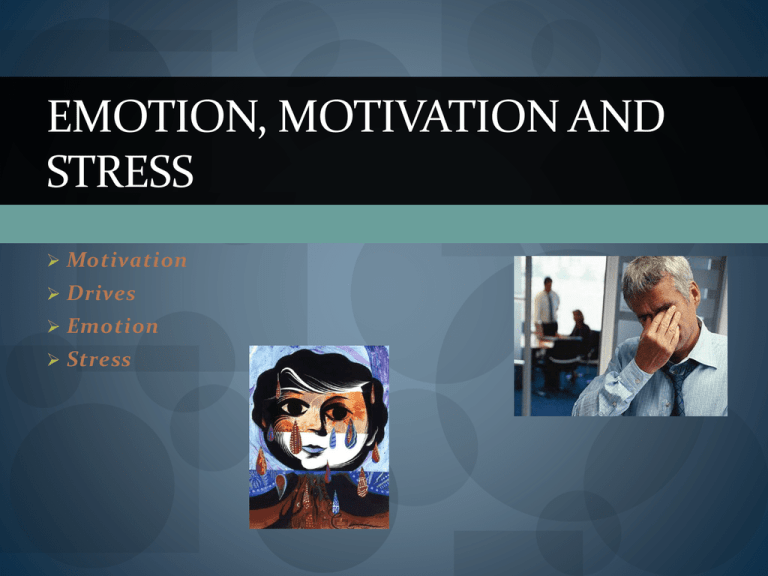
EMOTION, MOTIVATION AND STRESS Motivation Drives Emotion Stress True or False? T/F Getting away from it all by going on a vacation from all sensory input for a few hours is relaxing. T/F People feel hunger due to contractions in the stomach. T/F Fashion magazines can contribute to eating disorders among women. T/F Money can’t buy you happiness. T/F You may be able to fool a lie detector by squiggling your toes. T/F Vacations can be stressful. T/F Type A people achieve more than Type B people, but they are less satisfied with themselves. T/F Humor helps us cope with stress. Motivation Instinct: Inborn behavior that is characteristic of an entire species. Drive: A state of tension or arousal brought on by biological needs. Drive-Reduction Theory: Motivated behavior is aimed at reducing a drive. Motivation Primary Drive: A physiologically based unlearned motive, such as hunger. Homeostasis: A state of balance and stability in which the organism functions effectively. Motivation Intrinsic Motivation: A desire to perform a behavior that originates within the individual. Extrinsic Motivation: A desire to perform a behavior to obtain an external reward or avoid punishment. Hunger The hypothalamus contains: Hunger center: Stimulates eating. Satiety center: Stops eating. A fall in the glucose level stimulates neurons in the hunger center and inhibits neurons in the satiety center. Leptin may play a role in obesity. Sex: Response Cycle (Masters and Johnson) Excitement: Penile erection (males) and swelling of breasts and clitoris (females). Plateau: Sexual tension levels off. Orgasm: Male ejaculation and female uterine contractions; a loss of muscle control for both sexes. Resolution: Relaxation and a decrease in muscle tension. Hormones Hormones play an important role in the development of primary and secondary sex characteristics. Pheromones may influence sexual attraction in humans. Need for Contact Harlow’s monkeys demonstrated the importance of contact and affection. Learned Motives Aggression Achievement Power Affiliation Humanism Creator: Abraham Maslow Postulates of Humanistic Psychology: Human beings cannot be reduced to components. Human beings have in them a uniquely human context. Human consciousness includes an awareness of oneself in the context of other people. Human beings have choices and responsibilities. Human beings are intentional (Meaning/Value/Creativity). Yerkes-Dodson Law There is an optimal level of arousal for the best performance of any task: Easy tasks--relatively high Difficult tasks--low arousal Other tasks--moderate level Emotion James-Lange Cannon-Bard Cognitive Facial Feedback James Lang stimulus physio. changes cerebral cortex emotion Cannon-Bard cerebral cortex stimulus physio. reactions emotion Cognitive emotion environmental cues stimulus physio. reactions cerebral cortex Facial Feedback Theory Emotion is the experience of changes in our facial muscles. Types of Non-Verbal Communication Facial expressions Body language Personal distance Explicit acts Sources of Stress Change Hassles Pressure Frustration Conflict Self-imposed stress 5 Sources of Frustration in American Life Delays Lack of resources Losses Failure Discrimination Conflict The simultaneous existence of incompatible demands, opportunities, needs, or goals. Dealing with Stress Direct coping: Action taken to change an uncomfortable situation. Defensive coping: Convincing yourself that you are not really threatened or do not really want something that is unattainable. Types of Direct Coping Confrontation: • Acknowledging a stressful situation directly and attempting to find a solution to the problem. Compromise: • Choosing a more realistic goal when an ideal goal cannot be met. Withdrawal: • Avoiding a situation when other options are not practical. Coronary Heart Disease Mental stress predisposes one to CHD. Personality also plays an important role. Type A behavior: Respond to life events with impatience, hostility, competitiveness, urgency, and constant striving. Stress & the Immune System Stress can lead to: Colds or flu Depression Greater susceptibility to upper respiratory infections Increased vulnerability to cancer Sources of Extreme Stress Unemployment Divorce and separation Bereavement Catastrophes Combat and other personal attacks Posttraumatic Stress Disorder A psychological disorder characterized by episodes of anxiety, sleeplessness, and nightmares resulting from some disturbing event in the past. Occurs in soldiers, rape victims, victims of disasters.
